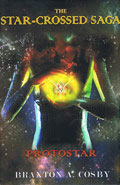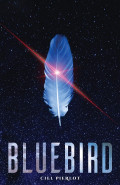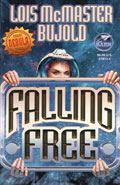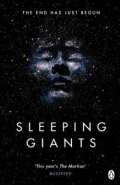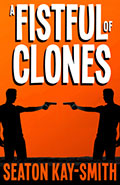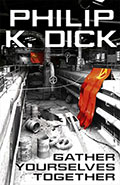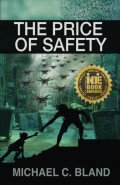Anomalies
By Gregory Benford

- Anomalies
-
Author: Gregory Benford
-
Publisher: Lucky Bat Books
- ISBN: 9780980000000
- Published: May 2012
- Pages: 214
- Format reviewed: E Book
- Review date: 25/05/2012
- Language: English
- Age Range: N/A
Reviewed by Matt Karder. I have never been an ardent fan of short stories but this collection certainly is an exception. The flow within the prose is a major factor. Short sentences bursting with content focus the reader’s attention very effectively.
A Worm In The Well & The Worm Turns
The first two titles are effectively parts of the same story. Claire runs and owns a mining craft, hauling ore from Mercury to Luna for a living. Her relationship with her only companion, Erma (the on-board computing presence) is brilliant. Exchanges are technically challenging but laced with humour and sarcasm. Claire is hunted by an enforcer of the administration because she has fallen into serious debt. She tries to make a fortune by investigating an arch in the solar corona, which seems to be caused by a rare cosmic phenomenon. This is hard sci-fi and humour combined, which is potent and addictive. The trade-off between survival and reward maintains the tension throughout.
The Semisent
This is indeed a short story, fractionally longer than this review, yet it extracts manifold reflections from the reader. The young Iraqi girl’s life changes in every respect after her parents procure her a semi-sentient device from Germany. Amman, as she names it, becomes a soul mate and is the architect of a narrative arc – her future. Amman becomes a relationship beyond parents, friends and marriage. We never get to know her name, yet we feel we have known her all of our life. The author has a rare gift - devilishly clever use of language, accompanied by astonishing economy with words.
Twenty-Two Centimeters
The existence of not just one parallel universe, but many more, is an interesting proposal - but it is a massive leap of imagination to accept they could each be separated from one another by a mere twenty-two centimetres. Gregory Benford manages to articulate the model in a very convincing way. The ‘Counter Earth, Moon and Sun’ all exist in a much colder membrane. The mission to discover what we can learn from the Counter universe and its application to the future of our universe is a fascinating journey. The author’s command of scientific principles and the written word make a very complicated premise relatively transparent to the reader.
Applied Mathematical Theology
I can see this three page hunt to explain an obscure but observable pattern in Cosmic microwaves ruffling a few feathers. It is a clever way of igniting the aged debate over Creation and Evolution. The world’s best physicists become obsessed with making sense of the pattern through equations and numbers. One of the possible conclusions is that God was and still is a physicist. Not surprisingly, the reader is left to decide on the delicately balanced research.
The Man Who Wasn’t There
An abrupt change of pace heralds a highly-charged, pulsating encounter in France. The Islamic Front has optimised their push-pull strategy of terror and claims of repression in Europe. It is portrayed as correction of the dark era of the Crusades. It has now been distilled down to a race in technological development, targeted to extraction of information. This short depiction resonates with the recent events depicting the death of Bin Laden. The aforementioned distillate is a phenomenally concentrated voyeuristic experience, and just when it seems to be over there is a rather worrying revelation. It is difficult to overstate the author’s ability to say so much with so few words.
The Final Now
A perfect example of the Curate’s Egg. The old chestnut of whether the Universe was created, happenchance, or inevitable, is the only thing under discussion. From the point of origin to the inevitable fracture of space-time, HE and SHE reminisce and contemplate the final darkness, and are vigorously challenged by ONE. The language is exquisite and the proposed laws of physics are somehow softened to fit this languid and sad discourse. This is a highly complex argument which proposes that it really makes no difference whether or not a deity was involved in The Beginning, as the die is cast at that time. The choices thereafter are extremely limited – a ‘Curate’s Egg’ is the legacy of the Big Bang.
Comes The Evolution
This story could not be more different than the previous one. In fact it is difficult to know what it is really about, except that it is difficult to stop reading it. Events and characters abound yet the direction is elusive. At the end there is a feeling of – ‘should I read it again? - or I must have missed something.’ I did and I hadn’t. I conceded to checking the author’s afternotes for the first time so far, and was relieved to find that I wasn’t expected to find any pearls of wisdom. Fascinating.
Anomalies
An amateur astronomer, whose craftsmanship is in carpentry, discovers and receives credit for a unique observation. The Moon is fractionally ahead of its normal elliptical orbit. Then the entire astronomical world detects a distortion in the arrangement of the stars viewed through the space where the moon should have been. The carpenter, Geoffrey, asks a question of the foremost experts at Cambridge University; one with which they are not comfortable. The fascination intensifies and then Geoffrey makes another observation, of even greater significance. The explanation delivers a bit of an anti-climax. Maybe there was no alternative.
Caveat Time Traveler
This is a very short story, and packed with cynicism. There is hardly time to be a protagonist, but the first person narrative is used cleverly to illustrate the continuing need for survival instinct well into the future. Travellers from the past are easy pickings. The cynicism is at least laced with humour.
Lazarus Rising
Gripped by the very first sentence, the reader is thrown into the situation we have all heard about where the patient on life support can hear the medics discussing switching off the machine. The black semi-existence into which the author guides us is utterly real. I could feel (actually not feel) the lack of control in breathing, vision, heartbeat and numerous other functions. What can be felt, almost as a substance, is panic. The process of establishing calm and how to respond is riveting. What comes afterwards cannot be mentioned here without spoiling the experience, and the ending, which is superb. Nothing short of genius.
Isaac From The Outside
Yet another surprise – a poem. The only thing to say is "read it." Priceless.
Gravity’s Whispers
Another really short story. It is not really long enough to contemplate number theory, let alone comprehend the leap to the Riemann Zeta function. It does however question some of the hopes we may have for the SETI programme.
Ol’ Gator
This is quite a disturbing first person account of the conflict in Iraq. It really brings home the relentless disorientation of being in a place with no reference points to previous life, and with no finite end point in terms of duration. It neatly describes an example of seeking a connection to home, in this case living close to alligators. The author manages to convey a totally real perception of the fog of war – not only the carnage but the utter futility of identifying with the cause, which seemed so clear at the outset. The consequence of scars in the mind prevails long after the tour of duty, back in a world which has become equally difficult to understand. Harrowing stuff.
The Champagne Award
The breadth of the author’s ability is evident in this leap forward a few years. With the world’s population over eleven billion, Kid-Credits are introduced. It is tightly controlled and the limit is one person – one child. This applies to heterosexuals, gays, lesbians and single people. The disturbing side to this is the rackets which appear like tumours, for example, faked lottery Kidcreds costing astronomic sums on the black market. The great author Arthur C Clarke once said – ‘It is often more difficult to make the normal seem bizarre than it is to make the bizarre seem normal.’ This story is a perfect example.
Mercies
This is a difficult story to describe without giving too much away. Suffice it to say that the protagonist, Warren, is a responsible young student who attracts psychological bullying from testosterone-fuelled peers. Later in life he accretes enough wealth to embark on his ‘calling.’ As a time travelling vigilante, he ‘corrects’ timelines from the past by erasing serial killers, some of them quite famous. Morally challenging, immersive, and brilliant.
Doing Lennon
If the previous title was difficult to review, this one is virtually impossible. Yes it does refer to John Lennon, and an organisation – Immortality Incorporated. The re-animation of the Beatles, beginning with Lennon ought to whet the appetite of most readers. What follows simply has to be read rather than reviewed. It is yet another variant on the talent of Gregory Benford.
Summary
I have to revise my opinion of the power of short stories if they are written in the style and scope typical of this author. Benford is obviously an extremely knowledgeable physicist, and this is coupled with a unique and absorbing way of setting his ideas in print. The prose is punchy, elegant and super-concentrated. It feels as though there is never a single word wasted, every syllable is essential. His afternotes are well worth reading, and are probably more informative than these reviews. He states that most of his work is hard science fiction and some readers may have difficulty with terminology, but this is more than made up for by the stories themselves. One cannot fail to be impressed with the sheer magnetism of even the shortest tale. Highly recommended.
Written on 25th May 2012 by Matt.
